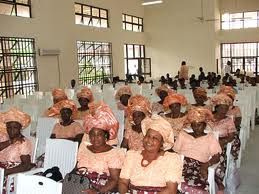Women in Business across maritime, power, manufacturing, taxation and financial services sectors have urged the federal government to redress the economic setback of infrastructure deficit.
The stakeholders who spoke at the Women In Management, Business & Public Service (WIMBIZ) policy dialogue on the Ease of Doing Business in the country said provision of infrastructural is a critical need common that enhances productivity and sustenance of all economic activities.
They said that the presidential drive to eliminate constraints plaguing business environment must prioritise investment in productive capital infrastructure.
The managing Director, Nigerian Ports Authority (NPA) Hadisa Bala Usman who was among the panelists said the authority has earmarked on the construction of access routes into the ports. She said that the NPA was determined to take holistic measures at improving accessibility and upscale of activities around the ports.
“We have reached certain level of agreement with the ministry of power and housing but as the ports authority we have committed funds to the construction of the road. We have competing needs for our resources but access into our ports is every important. One of the first ones is the Apapa wharf road which the Nigerian Ports Authority is providing N1.8billion in partnership with Dangote and Flour Mills to fully reconstruct. It is not our responsibility as the NPA but I think we need to rise above our top and work in partnership and collaboration to be able to deliver on a mandate that is critical,” She said.
Speaking on upscaling business activities with power stability, Managing Director, Rural Electrification Agency, Damilola Ogunbiyi assured that the agency would deepen power connection in unconnected areas. According to her, the government has a role in bridging the liquidity gap, and ensuring that all agencies are accountable for their actions.
She said: “We are looking at increasing power supply through sustainable solution renewable solution. We are also prioritising agriculture communities because if you give them power, you could see what they will be able to produce. Every agency will also be accountable. In a few months I think you will see the clear difference in people getting more reliable power supply and more people who have never had light being connected and then we will see rise in GDP growth because the potential of what they can do is humongous.”
PWC Nigeria Head of Tax and Regulatory Services, Mr Taiwo Oyedele said the economy will continue to be disadvantaged on tax maximisation if infrastructural deficit persists. He said that the prosperity of small and giant industries was inversely related to the expansion of tax base.
“We need to reform Nigeria in terms of policies, making sensible laws. Tax is never a lone issue. If businesses are not thriving and individuals have no income, there is nothing to call tax. The tax net might be increasing but the tax base is decreasing. We have to look at a robust, consistent and well coordinated policies and build strong institutions” Oyedele said.

